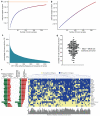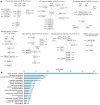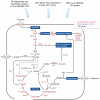Transposon mutagenesis identifies genes driving hepatocellular carcinoma in a chronic hepatitis B mouse model
- PMID: 24316982
- PMCID: PMC4131144
- DOI: 10.1038/ng.2847
Transposon mutagenesis identifies genes driving hepatocellular carcinoma in a chronic hepatitis B mouse model
Abstract
The most common risk factor for developing hepatocellular carcinoma (HCC) is chronic infection with hepatitis B virus (HBV). To better understand the evolutionary forces driving HCC, we performed a near-saturating transposon mutagenesis screen in a mouse HBV model of HCC. This screen identified 21 candidate early stage drivers and a very large number (2,860) of candidate later stage drivers that were enriched for genes that are mutated, deregulated or functioning in signaling pathways important for human HCC, with a striking 1,199 genes being linked to cellular metabolic processes. Our study provides a comprehensive overview of the genetic landscape of HCC.
Figures






References
-
- Imbeaud S, Ladeiro Y, Zucman-Rossi J. Identification of novel oncogenes and tumor suppressors in hepatocellular carcinoma. Semin Liver Dis. 2010;30:75–86. - PubMed
-
- Wurmbach E, et al. Genome-wide molecular profiles of HCV-induced dysplasia and hepatocellular carcinoma. Hepatology. 2007;45:938–947. - PubMed
Publication types
MeSH terms
Substances
Grants and funding
LinkOut - more resources
Full Text Sources
Other Literature Sources
Medical
Molecular Biology Databases

